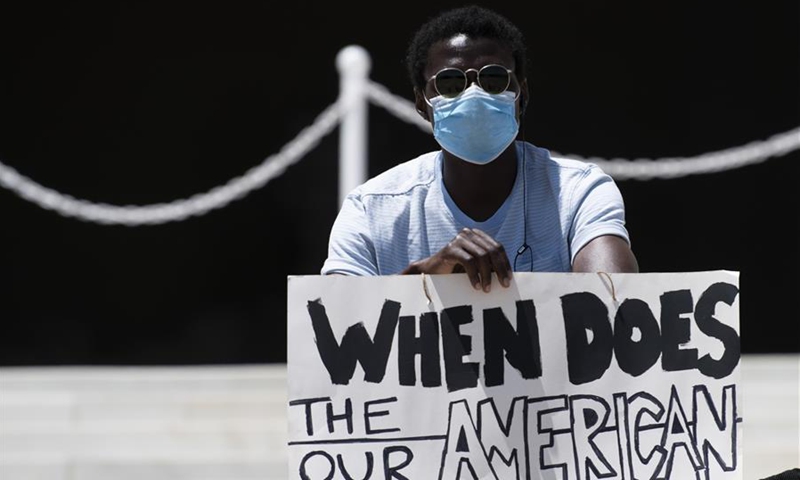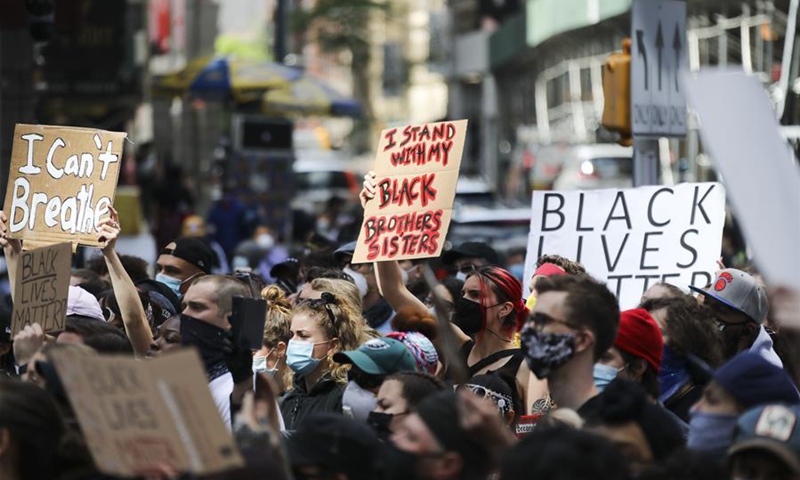US elites backing HK riots snub grassroots protests on their soil
By Jack Campbell Source:Global Times Published: 2020/6/2 20:00:12

A protester sits in front of the Lincoln Memorial during a protest over the death of George Floyd in Washington D.C., the United States, on June 1, 2020. (Xinhua/Liu Jie)
After former police officer Derek Chauvin was seen on camera kneeling on George Floyd's neck for eight minutes and 46 seconds, global protests ignited against racism and excessive violence. Floyd's murder by Chauvin resulted in the officer's dismissal. Four days later, he was charged with third-degree murder and manslaughter.
Many protesters demand Chauvin be charged with first-degree murder, and also that the three officers accompanying him be arrested, according to Eugene Puryear, a journalist with BreakThrough News, reporting from Minneapolis. He told the Global Times that judicial officials often inappropriately charge suspects when they are police officers to increase their chances of being exonerated.
Puryear recalled the case of Rekia Boyd, a black woman killed by off-duty Chicago police detective Dante Servin. "The DA [district attorney] deliberately undercharged him," said Puryear. Servin was found not guilty.
In late May when footage of police harassment of protesters and civilians surfaced, militant demonstrations spread to more US cities. But despite grassroots resistance, police have largely responded with excessive violence.
Puryear recalled on May 30 - the night Minnesota Governor Tim Walz activated the National Guard - there was absolutely no chaos during protests in Minneapolis. "Everything was peaceful. There was no activity that made you think you'd need all these riot police," he told the Global Times.
Amid nationwide protests, police have arrested dozens of journalists. Others have been shot with rubber bullets. In Brooklyn, an NYPD van plowed into protesters.
As Trump has threatened to invoke the Insurrection Act of 1807 to deploy the military against US citizens, US activists persist in demanding justice for George Floyd, as well as Breonna Taylor and Ahmaud Arbery - black Americans recently killed by the police or members of the public.
Michelle Bachelet, the UN's top human rights official, called on the US to address systemic racial inequities. "The role that entrenched and pervasive racial discrimination plays in such deaths must also be fully examined, properly recognized and dealt with," said the UN High Commissioner for Human Rights.

People protest over the death of George Floyd in New York, the United States, June 1, 2020. (Xinhua/Wang Ying)
Repression under wraps
Police behavior was consistently aggressive, said Puryear. "[Minneapolis] turned into an armed camp… We were tear-gassed just trying to cover it."
Governor Walz blamed out-of-state protesters for the violence, but Puryear said "the vast majority of people [his team] saw and talked to were from Minneapolis."
Puryear noticed a shift in the coverage as demonstrations continued. When National Guard forces came in, the media portrayed the protests as having ties to foreign governments and even drug cartels. "What stands out most to me is the disinformation from these politicians," who are supposed to care about the public, said Puryear.
"Most people are not buying into the demonization that this is a Russian plot," said Puryear, who added that even those who are not fully supportive of the movement's tactics understand protesters are simply angry at racism.
Puryear was right next to NBC reporters when he was tear-gassed. "It's been clear from the beginning they didn't want this to be covered," he said.
Amid growing large-scale opposition to minorities and reporters being targeted, the Trump administration has continued a historically rooted backlash against civil liberties. In 2017, the US Federal Bureau of Investigation listed "black identity extremists" in a counterterrorism report sent to police departments. The designation has been changed to "racially motivated violent extremism."
Hypocrisy to HK
The protests in the US and negative coverage they have received have been in stark contrast to US coverage of the 2019 Hong Kong riots. "The US intentionally turned a blind eye toward brutal violence, massive vandalism, threats and actions of terrorism, as well as far-right racist hatred toward those from the Chinese mainland," said Zhang Sheng, a research fellow of the Chengdu Institute of World Affairs. He noted the US "unsurprisingly but ironically" only chose to speak out against violence committed in its current domestic protests.
"The Chinese people still vividly remember that when countless innocent civilians, including both native people of Hong Kong and travelers from the Chinese mainland, were ruthlessly assaulted, severely beaten, or even cruelly murdered by anti-government rioters and many public and private properties were destroyed, American politician Nancy Pelosi irresponsibly called the Hong Kong riot a 'beautiful sight,'" noted Zhang. "But on June 1, facing the massive movement demanding justice for African Americans, the same Pelosi urged Americans to seek 'unity' rather than 'division.'"
Xie Xiaohong, a committee member of the All-China Youth Federation, pointed out, "the Hong Kong police adopted much more humane and more restrained measures than the US. police currently does. The strategy of Hong Kong police was simply to disperse the protesters, rather than to forcefully arrest all of them."
"Unrest in Hong Kong lasted for about half a year, but the HK police chose not to use over-strict methods," said Xie who noted the US protests have only been going on for about a few days "but the military is already mobilized and governmental officials have already labeled protesters as mobs."
Xie expressed strong disappointment toward Western mainstream media's selective reporting. "When the mobs at Hong Kong were assaulting civilians and committing vandalism, the Western media say that they are 'protesters fighting for democracy and freedom,' but when similar violent behavior break out in the US, they condemn the violence or even try to defend the police by saying that George Floyd's death was not caused by the actions of the police."
"The double standards of those politicians and mainstream media fully unveil their hypocrisy and imperialism. They portray themselves as defenders and promoters of values such as democracy or freedom, but in fact they care about nothing except their own 'national interests' or more specifically the interests of the ruling class," said Zhang, who has spent time in the US working with civil rights and peace movements.
"We hope that the current situation in the US will not only expose the hypocrisy of many US politicians, but also encourage the American people to rethink their actual 'national interests,'" said Zhang.
He said the "interest of the elites, arms dealers, military leaders, certain stock opportunities tycoons, and certain anti-China lobbying interests groups" supporting secession in Hong Kong "do not overlap with the interests of the common people in the US, especially the working class and the oppressed minorities who desire peace rather than international conflict."
Posted in: IN-DEPTH,CHINA FOCUS,FOCUS1